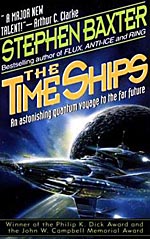
![]() couchtomoon
couchtomoon
9/29/2015
![]()
Jumping forward 100 years from Wells' original The Time Machine, to 1995, we find this BSFA-winning novel that continues the story where H. G. left off. Like me, perhaps Baxter wasn't completely satisfied with the end of the novel and its heavy-handed moralizing about the evil, horrible Morlocks (who are really just a product of their adaptation to exploitative, inhumane conditions. H.G., did you forget what you were trying to say?). Obviously, Baxter wanted to course correct, but, as we know from every time travel tale ever in the history of everhood, you just can't course correct because of the Paradox Paradox, and infinite Multiplicity issues. Baxter realizes this, and what might have started as a 100-200 page addendum, turns into a 600-page tome about many alternate futures and pasts.
I wish it had an audio version to get me through the dry parts.
In the original book, the story ends when Unnamed Protagonist takes off for times unknown, motivations unspoken. This ambiguity bothers some readers. In Baxter's version, consumed with a terrible guilt that is slightly conveyed in the prose, Unnamed Protagonist has the sudden urge to return to the future to prevent the death of Weena, his beloved Eloi friend. When he arrives, the sun is dark and the earth is dead, and he learns from the Morlock Nebogipfel (a cameo from another Wells tale) that he has arrived in an alternate future of a more advanced Morlock race, where engineering advances (such as a Dyson sphere) have possibly been created by Unnamed Protagonist's time travel meddling. He and the Morlock return to 1891 to put things right ("what once went wrong..." ) and visit with his younger self only to be picked up by a WWI time travel tank from 1938. (Yes, I said 1938. Multiplicity, 'member?) From there, they visit the Paleocene (no stop button on escape vehicle. naturally.) and start human civilization way too early, followed by another visit to 1891 where humans have abandoned earth to highly intelligent, slow-life hive mind tech creatures, then they go back to the beginnings of time in, oh, here they are, the Time Ships, and confront the mysterious "Watchers" and understand the meaning of time (maybe?) before returning to the 1800's as we know it. Still unsettled, our protagonist goes back to AD 802,701 to save Weena and lead an Eloi agrarian revolution against the evil Morlocks.
Wait, that's not satisfying at all. That doesn't address the "Morlocks are evil" issue. I wanted more sympathy for those far future Morlocks. I wanted the future degenerated Morlocks to end up being highly rational legacies of a proletariat uprising who independently decide to end their slaughter of the Eloi by forcing shared working conditions on the overprivileged class. Or at least something a little less morally black-and-white.
Despite the disappointing denouement, it is fun to see Baxter's visions of far futures and pasts, and to watch THE time machine evolve from a rusty cart to car to tank to spaceship over the course of backward and forward millennia. At the same time, those fun moments lose their luster thanks to 600 pages of plot bloat. Stuff happens, more stuff happens, and still more stuff happens. Most importantly, Baxter misses the ship with what Wells is trying to convey in The Time Machine, which has little to do with the mechanics and inventiveness of the actual vehicle, and more to do with social evolution in an unchecked industrial society. Wells' prophecy of the fallout from the industrial revolution is very clear, (even though he also fell into the "Morlocks are evil" trap at the end). Wells' technological extrapolations are less clear, and, despite the title of the original story, the time machine is not the focus. Baxter misses this crucial point and gives us nearly 600 pages of (sometimes fun) tech porn and far-out imaginings.
I can't help but compare this novel to David Gerrold's delightful little 200-page The Man Who Folded Himself (1974), where paradox, psychology, and human complexity are conveyed so well in so few pages. Or, Michael Bishop's No Enemy but Time (1985), which Jesse at Speculiction just reviewed and reminded me of how one time travel novel can say so much about humanity and being out of place. While Baxter certainly puts a lot of thought and surface detail into his novel, he doesn't examine the human condition nearly as deeply as these two examples, despite the plenitude of opportunities to do so. It seems like a sequel to Wells' The Time Machine should be accountable for so much more. (Jesse also did a nice review of Gerrold's novel not long ago.)
There is a long history of The Time Machine sequels and alternate endings, although this may be the only one Officially Authorized by the Estate. I'm especially curious if Wells' own alternate ending would be more satisfactory, but I can't find much about it.
http://couchtomoon.wordpress.com